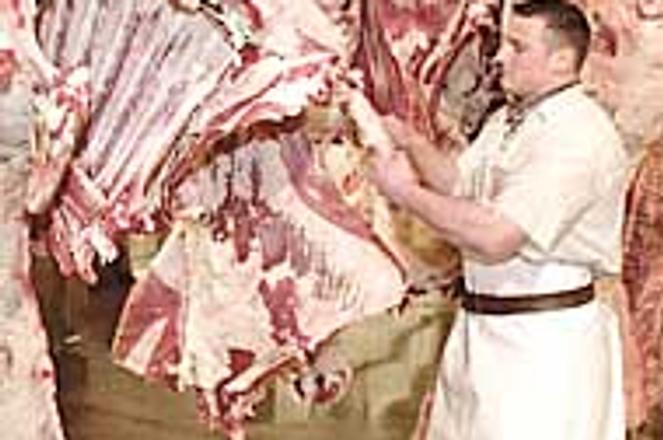SLOVAK beef producers are wondering where they will now place excess production.photo: TASR
WORRIED Slovak cattle farmers, already fearing lower demand for beef at home, are warning of more problems following a decision by the Czech Republic to ban imports of cattle, beef and beef products from Slovakia.
Having exported more than 2,500 head of cattle to the Czech Republic in the first quarter of this year, the farmers say contracts worth hundreds of thousands of crowns are now threatened.
"We've already exported 250 tonnes of meat to the Czech Republic this year. We had contracts prepared for exports of 100 tonnes a month. In Slovakia we've got nowhere to put that kind of volume," said Ján Svitek, manager at the Sereď Meat Company in western Slovakia.
A Czech decision on April 3 to ban beef imports from its former federal partner came amid growing concern over the presence in Slovak herds of Bovine Spongiform Encephalopathy (BSE), a cattle disease many scientists believe to be linked to the human brain wasting disease CJD.
The ninth case of BSE in Slovakia was confirmed on March 29 in a cow on a farm in Moldava nad Bodvou, in eastern Slovakia, and was the third identified case of the disease in the last month. No other country in the former eastern bloc has recorded as many cases, although few test as rigorously as Slovakia, according to the Slovak veterinary authority.
"Another three cases of mad cow disease were discovered in Slovakia during a very short period. Our attitude towards Slovakia, that is our willingness to sanction imports of beef from this country, was in the past more than benevolent, in marked contrast to our attitude to EU countries in this respect.
"That is why we decided to ban imports of beef, cattle and beef products from Slovakia," said the director of the Czech Veterinary Administration, Josef Holejšovský, after the ban was announced.
In retaliation the Slovak Chamber of Agriculture and Food announced that it was banning imports of beef, cattle and beef products from the Czech Republic, effective April 5. The reason given for the ban was that Czech cattle had been identified as being in the same risk category for BSE as Slovak cattle.
Slovak farmers have also joined Agriculture Minister Pavel Koncoš in claiming the ban by Prague was a response more to fears of competition than concerns about bovine health.
At the end of March, subsidies that Czech farmers had been receiving for beef exports were stopped. Until then, demand on the domestic Czech market had been filled largely by imports from Slovakia.
According to the Slovak Agriculture Ministry, 1,116 tonnes of beef was exported to the Czech Republic in the first quarter of the year, including 2,538 head of cattle. Only 153 tonnes of beef was imported from the Czech Republic in the same period.
Slovak farmers say that the cessation of the subsidies forced Czech producers to turn back to their own market, where they had found they were unable to compete with cheaper Slovak beef.
"Our meat is Sk5 to Sk10 [$0.10 to $0.20] cheaper per kilo, and the difference is exacerbated by the strength of the Czech crown. Czech producers can't compete with our prices," said Svitek.
But Prague has denied any economic motive behind the ban. "The reason is purely because of concerns over BSE," Holejšovský said.
Representatives of both countries' veterinary authorities were expected to meet on April 11 to discuss the bans, which the Czech Veterinary Association has suggested could be lifted within two months.
However, even if the bans are lifted, farmers remain concerned over the potentially devastating effects of a sudden rise in the number of cases of BSE in Slovak cattle.
Some farmers in western European states, Britain in particular, have been devastated by the disease. Since the first case of BSE was confirmed in Slovakia in October last year, beef sales in some parts of the country have begun to slide.
The Slovak Chamber of Agriculture and Food has said that it has seen a dramatic fall in demand, and that it is now studying the effects of the BSE cases on the market.
Some grocers and butchers have said they have been forced to cut back on orders of beef, and to fill shelves with more pork and poultry since last October.

